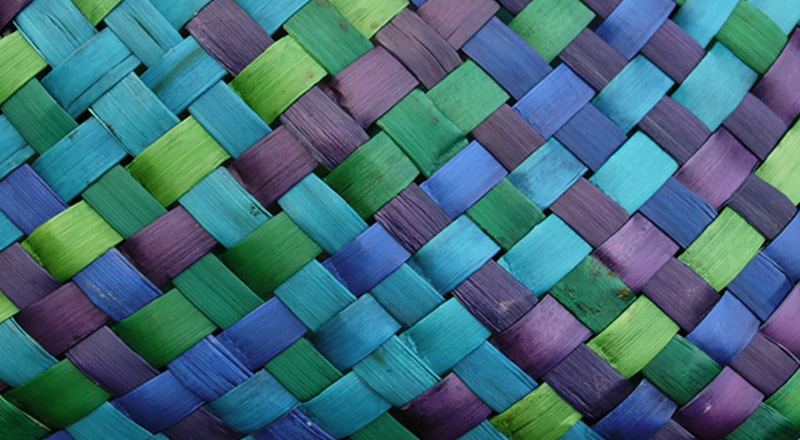Unbroken Weave
Nga mihi ki te hunga e whai ana i to rātou whainga… (Greetings to everyone who is pursuing their purpose),
This month’s whakataukī (proverb) is: “Hē o te kotahi, hē o te katoa” (The mistake belongs to the collective).
I’ve said before, I started life in Canons Creek, Porirua, Aotearoa New Zealand—a notorious neighbourhood in the 1970s, noted for its gang violence and poverty-related issues. One of my most vivid memories is of playing on my front porch with a Tonka toy truck, when a skinny, dishevelled, heavily tattooed white guy stumbled into the adjoining State House one morning bleeding profusely from a stab wound, knife still in. I don’t remember much else about that morning. My early life in ‘da Creek’ is just snapshots. However, when I first saw the movie “Once Were Warriors” at Missionary Training College, I remember feeling viscerally triggered by many of the scenes.
In contrast to the trauma, I also fondly remember collectively singing the national classic Tūtira mai, which became the All Blacks rugby team anthem in 2017 (where is it now when we need it most?!) and recorded again in 2020 as a collaboration between US and NZ armed forces with a slightly updated melody in places. As I noted back in 2017, the song was composed by Anglican Canon Wiremu Te Tau Huata of Ngāti Kahungunu (my tribe) in the late 1950’s. It grew in popularity as he performed it in churches and Bible classes around the nation. Its use in public schools was not done with Huata’s consent or credit and sadly the version we learned at the time was a little corrupted. Such is the way when cultural artifacts are appropriated!
Canon Huata was involved in the Ecumenical Movement, concerned for the unity of the global Church, most visibly represented by the World Council of Churches today. Tūtira mai (Come, align) is informed by Huata’s desire to see believers unified. In English, the song’s lyrics translate to:
Come together and align as one, people | All of us, all of us (line repeated)
Seek after enlightenment/understanding, and love of others, everybody!
Think as one, act as one | All of us, all of us.
As my doctoral work was drawing to a close in 2017, from within an Evangelical camp, I considered the fracturing of our Protestant faith and the challenge that the Ecumenical Movement seems not to have solved, while Evangelicals don’t attempt to or don’t even acknowledge that there is a problem. We fracture into increasingly diverse movements and new denominations. With unity in mind, I concluded my thesis with the lyrics of Tūtira mai as a statement of hope in keeping with Jesus’ prayer in John 17. But I recast the song as a lament in a minor key, a waiata (song) that I perform from time to time to express my yearning for the alignment to which the lyrics call us. The alignment I sang about as a boy in primary school, I believe, is the antidote to the horror of conflict, aggression and outright violence that was the stuff of my upbringing. The song speaks of relational reconciliation to a world ripped apart by acts of relational destruction. Its melody (whichever way it is sung) is a gospel melody.
We overcome the enemy by the blood of the Lamb… What is the blood if not whakapapa (lineage, belonging, heritage)?
For Māori, unity within a family group or tribe is assumed. The raranga (weave) is whakapapa, it is in the blood (or via adoption), and cannot be broken. Relationships can be strained, and communities wounded by misdeeds, but the connection remains. This kind of assumption is rare these days, at least in what I call the “Industrial world”. It is still very much the norm for those with values aligned with the “Indigenous World”, which assumes deep interconnections between all things and understands our lived reality in relational terms. It should be the norm for those of us in Christ too. After all, we overcome the enemy by the blood of the Lamb (and our testimony to that fact — Revelation 12:11). What is the blood if not whakapapa (lineage, belonging, heritage)? Eurocentric theologies focus on the sacrifice and that is undeniably significant, but the shedding of blood was for the reconciliation of relationship. So the two, belonging and sacrifice, are intimately related (pun intended). Tūtira mai.
For all the challenges that can arise in a collectivist social setting (no more so than in an individualist one), those who carry such values, fashioned over eons in tribal contexts, are better equipped to hold unity-in-tension and deal effectively with those who would threaten such unity. In a 2021 interviewwith Moana Maniapoto, Māori kaumatua (elder and statesperson) Tā Tīmoti Kāretu observed,
“The old people said: “Hē o te kotahi, hē o te katoa.” The mistake belongs to the collective. Everything’s collective with us. Because that’s the only way you can get any discipline—by saying you embarrass us all when you do whatever you do.” But, he laments, “it just doesn’t work anymore, which is sad because it was a good way of keeping the community well-behaved (aligned).”
In the Māori world there is no word for guilty.
This was a response to Moana observing that in te ao Māori (the Māori world) there is no word for guilty. Instead, in keeping with Tā Tīmoti’s response, there is just responsibility. You’re not guilty for what you’ve done so much as you are responsible for breaking faith, for breaking the peace. And so, you are responsible for restoring it. Tūtira mai.
I have recently had conversations with Anglicans on both sides of a rift that threatens to divide the global communion. Both feel they are holding true to the faith with their application of the Word (Scripture) in the world (culture). When I express my sadness that it may come to yet another schism in Protestantism (which itself is the result of a schism) representatives of each side insist that it is not them breaking faith but the other. As we look back through Church history with one particular understanding of unity, it would seem that Jesus’ John 17 prayer has abjectly failed.
Nowhere in the material universe does harmony exist without tension.
That is one interpretation. However, if we instead viewed “as one” in a collectivist way, as an integrated singularity, an indivisible one-ness, an unbreakable weave; if we view it as an expression of harmony, we see that in spite of the tensions, rifts, and schisms, the connection remains. Jesus’ prayer is fulfilled. This, after all, is how tribes, languages, people, and nations are formed, yet we remain one humanity, made in the image of God. As I am wont to say now, nowhere in the material universe does harmony exist without tension. You cannot create harmony without tension. Harmony is an integrated singularity of multiple tones (tone = tension). In the cosmos, a black hole is called a singularity, the potential tipping point of Artificial Intelligence taking over is called a singularity. The idea signifies the gravity of something drawing all things into itself (cf. John 12:32).
“That the world will believe… that the world will know” (John 17:21-22 NLT) that Jesus was lovingly sent to usher in New Creation (or the Kingdom of God if you wish) is God’s primary purpose for us this side of eternity. It is to this reality that we are all witnesses. When one of us makes a mistake, all of us are implicated and affected. We each must take responsibility for repairing the offence, for perpetually repenting and reconciling with the collective. While we may differ on many things because we view them from different biblically-faithful perspectives, the weave of faith holds. It only appears torn to the one who rejects the possibility that those who think differently do not belong in the family. In which case, such a person may be disqualifying themselves. Holding fast to the essentials (and being wary of outright heresy), our extra convictions may differ but our love for one another must not wane.
James notes, “the testing of your faith develops perseverance. Perseverance must finish its work so that you may be mature and complete, not lacking anything” (James 1:3-4 NIV). What is this faith if not the fact that Jesus has made us an integrated singularity—one spiritual whakapapa? Persevering with one another’s differences, through the trials or troubles that we cause one another, strengthens our Christlike character. Our pathway to maturity starts by accepting that we are inseparable in spite of our differences. Our shalom/harmony, is our single greatest witness to the world of the power of God in Christ to forge New Creation. Tūtira mai ngā iwi, come into alignment people. This is how we #stayonmission.
Arohanui ki a koutou e haere ana ki te ao (love to you all as you go into the world),
Jay






